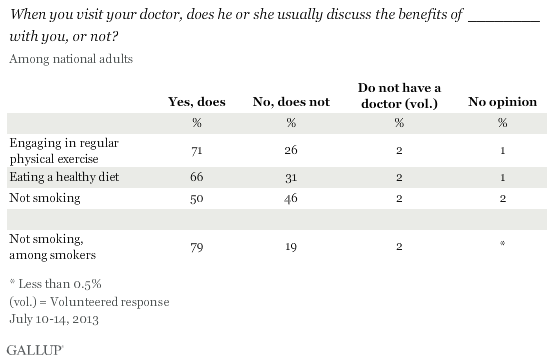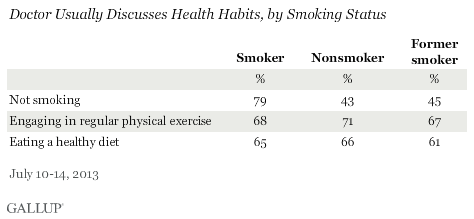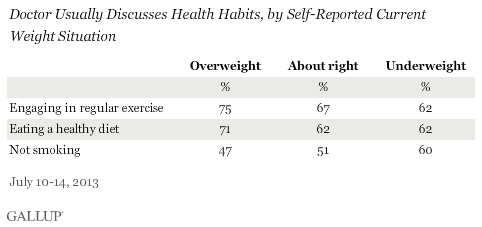WASHINGTON, D.C. -- As health experts increasingly focus on the medical benefits of a healthy lifestyle and preventative healthcare, Americans say their doctor does commonly discuss the benefits of healthy habits with them. Specifically, 71% say their doctor usually discusses the benefits of engaging in regular physical exercise and 66% the benefits of eating a healthy diet. Fewer, 50%, say their doctor usually discusses the benefits of not smoking, although that number jumps to 79% among smokers.

These data are from Gallup's annual Consumption Habits poll, conducted July 10-14.
Physicians are more likely to discuss regular exercise and eating a healthy diet -- positive behaviors related to maintaining a healthy weight -- with Americans than not smoking. This may reflect the prevalence of these issues in the U.S.: while 19% of Americans in Gallup's July Consumption Survey say they currently smoke, 45% say they are overweight.
U.S. Smokers Much More Likely to Say Their Doctor Discusses Not Smoking
Half of Americans overall say their doctor usually speaks with them about the benefits of not smoking, but that percentage soars among smokers (79%), who are significantly more likely than nonsmokers (43%) and former smokers (45%) to say their doctor usually discusses this.
It is certainly logical that physicians would intensify their efforts to speak about not smoking with current smokers, compared with nonsmokers and former smokers -- especially considering the time constraints during doctor's appointments. However, increasing the frequency of these discussions with nonsmokers could prevent more nonsmokers from ever starting and more former smokers from returning to old habits.
Smokers are no more likely than nonsmokers and former smokers to report that their doctor discusses exercising regularly and eating a healthy diet, reinforcing that doctors tend to tailor their message when it comes to smokers.

Physicians Slightly More Likely to Discuss Exercise, Diet With Overweight Americans
Although physicians clearly target their "no smoking" message at those who currently smoke, they are less likely to segment their audience when they discuss exercise and diet. Americans who classify themselves as "overweight" are only slightly more likely to say their doctor usually discusses the benefits of regular exercise and eating a healthy diet than are those who say their weight is "about right" or they are "underweight." However, the broad, self-reported "overweight" measure included in this study also may not isolate the more significantly obese individuals with whom doctors may in fact spend more time discussing exercise and diet.

A recent study found that one-third to half of the time, doctors did not tell their overweight or obese patients that they were overweight for a variety of possible reasons, but the Gallup data suggest that many physicians are at least more likely to discuss exercise and eating habits with overweight patients.
Implications
With the obesity rate in the U.S. ticking up and Americans exercising less so far in 2013, conversations between physicians and patients about the benefits of exercising regularly and eating a healthy diet may be key to reversing these trends. And while the smoking rate in the U.S. has declined over the past decade, physicians' conversations with smokers and nonsmokers about the benefits of not smoking may be essential if this downward trend is to continue.
U.S. physicians are in a unique position to influence their patients to make positive changes that will reduce the cost of smoking and obesity for individuals, employers, and the overall U.S. economy. Physicians are one of the most revered professional groups in the nation, with 70% of Americans rating medical doctors highly on honesty and ethics -- behind only nurses and pharmacists. Thus, it is more likely that Americans trust and follow the health advice that their personal doctor gives them. Additionally, doctors can serve as a good health example for their patients. Gallup has found that physicians are less likely than other employed adults to smoke and are more likely to report exercising regularly and eating healthily.
Under the Affordable Care Act, patients and physicians will have more opportunities to discuss interventions to improve their health habits. Diet and obesity counseling, and tobacco cessation interventions are available at no cost to many adults who have a new health insurance plan that began on or after Sept. 23, 2010. To the degree that such no-cost options increase doctor-patient conversations about smoking and obesity, the collective health of the nation will benefit.
Survey Methods
Results for this Gallup poll are based on telephone interviews conducted July 10-14, 2013, with a random sample of 2,027 adults, aged 18 and older, living in all 50 U.S. states and the District of Columbia.
For results based on the total sample of national adults, one can say with 95% confidence that the margin of sampling error is ±3 percentage points.
For results based on the sample of 338 smokers, the margin of sampling error is ±6 percentage points.
For results based on the sample of 1,689 nonsmokers, the margin of sampling error is ±3 percentage points.
Interviews are conducted with respondents on landline telephones and cellular phones, with interviews conducted in Spanish for respondents who are primarily Spanish-speaking. Each sample of national adults includes a minimum quota of 50% cellphone respondents and 50% landline respondents, with additional minimum quotas by region. Landline and cell telephone numbers are selected using random-digit-dial methods. Landline respondents are chosen at random within each household on the basis of which member had the most recent birthday.
Samples are weighted to correct for unequal selection probability, nonresponse, and double coverage of landline and cell users in the two sampling frames. They are also weighted to match the national demographics of gender, age, race, Hispanic ethnicity, education, region, population density, and phone status (cellphone only/landline only/both, and cellphone mostly). Demographic weighting targets are based on the March 2012 Current Population Survey figures for the aged 18 and older U.S. population. Phone status targets are based on the July-December 2011 National Health Interview Survey. Population density targets are based on the 2010 census. All reported margins of sampling error include the computed design effects for weighting.
In addition to sampling error, question wording and practical difficulties in conducting surveys can introduce error or bias into the findings of public opinion polls.
View methodology, full question results, and trend data.
For more details on Gallup's polling methodology, visit www.gallup.com.
